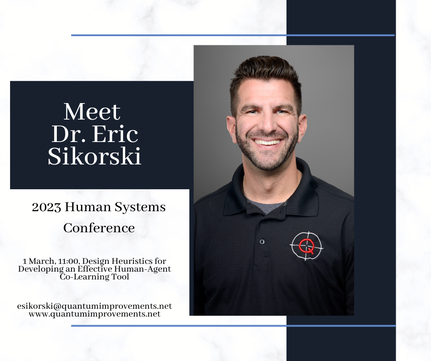|
The USAF has funded the development of an AI-driven co-learning partner that monitors student learning, predicts learning outcomes, and provides appropriate support, recommendations, and feedback. As a trusted partner, AI co-learning agents have the potential to enhance learning though the challenge is developing an evolving agent that continually meets the learner’s needs as the learner progresses toward proficiency. Taking a user-centered design approach, we derived a series of heuristics to guide the development of an AI co-learning tool for adoption and sustained use then mapped technical feature recommendations onto each heuristic. United States Air Force (USAF) Tactical Aircraft Maintainers are responsible for ensuring aircraft meet airworthy standards and are operationally fit for missions. Aircraft maintenance is the USAF's largest enlisted career detail, accounting for approximately 25% of their active duty enlisted personnel (US GAO, 2019). The USAF has successfully addressed maintenance staffing shortages in recent years, but the challenge has shifted to a lack of qualified and experienced maintainers (GAO, 2022). To address this issue, the USAF is seeking innovative ways to increase maintenance training efficiency, such as using artificial intelligence (AI) in the training environment (Thurber, 2021). Specifically, the USAF has funded the development of an AI-driven co-learning partner that monitors student learning, predicts learning outcomes, and provides appropriate support, recommendations, and feedback (Van Zoelen, Van Den Bosch, Neerincx, 2021). The AI co-learning agent goes beyond being a personalized learning assistant by predicting learning outcomes based on student data, anticipating learner needs, and adapting continuously to meet those needs over time while maintaining trust and common ground. As a trusted partner, AI co-learning agents have the potential to enhance learning by dynamically adapting to student needs and providing unique analytical insights. The challenge is developing an evolving agent that continually meets the learner’s needs as the learner progresses toward proficiency. Our literature review uncovered that designing an effective AI co-learning tool for initial adoption and sustained use requires observability, predictability, directability, and explainability (Bosch et al., 2019). Establishing trust and common ground are important factors that can impact the learner’s confidence in the agent and influence tool usage. Taking a user-centered design approach, we derived a series of heuristics that guide the development of an AI co-learning tool based on the identified factors. We then mapped technical feature recommendations onto each heuristic, resulting in 10 unique and modified heuristics with associated exemplar feature recommendations. These technical features formed part of the design documentation for an AI co-learning tool prototype. The research-driven design heuristics will be presented along with the technical feature recommendations for the AI co-learning tool. The audience will gain practical insight into designing an effective human-AI co-learning tool to address training needs. The application goes beyond the immediate USAF need to other services, such as the U.S. Navy, where maintainer staffing has declined gradually (GAO, 2022).
0 Comments
|
AuthorsThese posts are written or shared by QIC team members. We find this stuff interesting, exciting, and totally awesome! We hope you do too! Categories
All
Archives
June 2024
|


 RSS Feed
RSS Feed